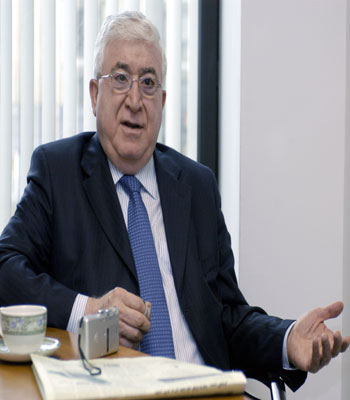
Dr Fouad Masum Asharq Al-Awsat Photo By Hatim Oweida
London, Asharq Al-Awsat- Dr Fouad Masum, a central figure in the Patriotic Union of Kurdistan (PUK) led by President Jalal Talabani, expressed his optimism that matters in Iraq will improve noting that, “If we as Iraqis and Iraqi political components care for the country, agree amongst ourselves, and forbid any foreign interference, then who can interfere?”
Masum, who heads the Kurdistan Alliance bloc in the Iraqi Council of Representatives, recently visited Asharq al-Awsat’s offices while in London and spoke about the current political climate in Iraq, starting with the National Dialogue Initiative proposed by Prime Minister Nuri al-Maliki, on which he said, “The parties opposed to the democratic process thought the government would maintain its firm approach towards them and would never agree to talk to them, but the dialogue has now been proposed and its provisions accepted by all parties involved in the political process even though there may be some observations that seek to enrich the initiative.”
“The dialogue will involve any party that agrees to enter the political process. Dialogue has been initiated with many groups, a number of which contacted President Talabani, while others contacted the US Embassy in Baghdad, before finally contacting Prime Minister Nuri al-Maliki. The dialogue is supposed to be held with any party willing to enter the political process, and this party will have to agree to dialogue with the government. The parties refusing to do so cannot be dealt with, and any party that retracts its position and wants to enter the dialogue may do so.” Ma’sum added,.
Masum feels that the federation experience would help rectify the current situation saying “With the exception of the Kurdistan Region, the government is perceived across the country as a decentralized government. The governorates do whatever they want, and they constantly refuse to implement ministerial decisions, but if a number of these governorates turn into regions, then these regions would put their affairs in order. This would help end the unnatural state in Iraq, and everyone would share security and administrative responsibilities, hence easing the state’s burden by ridding it of its daily problems and freeing it for strategic matters. If we cannot organize Iraq in is current form, then we should partition it, not cut it up, meaning that each part would organize its own affairs, and we would then find that regions have organized themselves. In the Kurdistan Region, for example, no efforts are required to keep security and administrative affairs in order. The same thing would apply to the remaining regions if they are formed and manage to organize their affairs, be they in the south or center of the country. However, a federation must not be forced on the people, but should meet the approval of the majority of its population.”
Commenting on remarks that Iraq should be divided into three regions, one Shiite, one Sunni, and one Kurdish, Masum said,” The term federation is new to Iraq. Those who understand a federation to be the equivalent of partitioning are mistaken, for there are successful federations in our third world, like those in India, Pakistan, and Nigeria, and even in the Arabian Gulf, where there is a modern version of the federation in the form of the United Arab Emirates, which is an extremely successful experience.”
As for regional interferences in Iraq, Masum stated that, “Regional countries must be dealt with as neighboring countries, and we must view them in a positive light and preserve our common interests with them. We ourselves are the source of the dangers in Iraq – if we as Iraqis and Iraqi political components care for the country, agree among ourselves, and forbid any foreign interference, then who can interfere? But the problem is that a certain party might contact a foreign party in hopes of strengthening itself and its position, all while other parties contact different foreign parties and so on. We Iraqis are therefore solely responsible for what is happening in Iraq. We must not accuse any foreign party of interfering, and we must not facilitate any interference.”
Turning to the Kirkuk issue, Masum said: “What worries citizens in Kurdistan is that the government has not activated the Kirkuk issue. There used to be a Kirkuk Committee chaired by Hamid Majid Musa (secretary of the Iraqi Communist Party), but a new committee chairman is being sought out to oversee this process. The search is on for a person who is acceptable to all — provided they not be a member of parliament – to supervise the activation of the normalization process in Kirkuk and the subsequent referendum and census. Kirkuk will not be an Iraqi problem if the constitution is observed, and we will accept the results of the referendum whatever they may be.”
